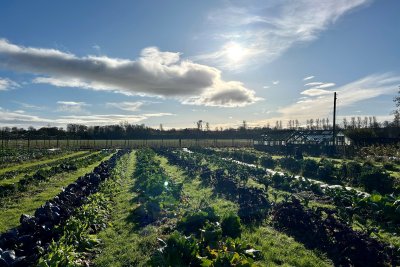 VideoBalmakewan Farm Aberdeenshire. Credit: Lucie Wardle
VideoBalmakewan Farm Aberdeenshire. Credit: Lucie Wardle
What: School food pilot introducing organic Aberdeenshire green split peas to schools menus in Aberdeen city, Moray and Highland via their catering service. The pilot covers the price difference between the organic price and the price the caterers would usually pay. A discount of 36% is applied at the point of purchase from the farmer.
The organic peas will be served in a range of meals across the three local authorities from April 2024 until at least December 2025. The pilot will include menu development to create new pea-based recipes, new educational resources developed by RHET and classroom visits from RNCI, and a producer engagement and knowledge-sharing event for farmers to share learnings from the pilot.
Where: Aberdeen City, Moray, Highlands and Aberdeenshire.
Which of the six approaches this pilot is taking: Public sector food procurement, horticulture strategy.
Demonstrating:
- Creating a supply chain for split peas in public sector catering.
- Menu options for split peas in public sector meals.
- Calculating the cost difference between organic and non-organic dried split pea.
Story: Phil Swire’s family have been farming at Balmakewan since 1992 and started converting the farm to become certified organic in 2019. This kickstarted a journey that led Phil to develop a deep appreciation for the critical importance of healthy soil in supporting life. Phil was growing green peas as a cover crop due to its nitrogen fixing qualities and selling the surplus harvest for animal feed when he had the idea that they could be better used as a nutritious addition to children’s school dinners. Aberdeen has a small population with lower density than larger cities in the UK but a large percentage of young people are eligible for free school meals.
Phil Swire said:
UK agriculture is on its knees, the future is bleak both for our national farming industry as well as our national health with ever increasing consumption of UPFs. the 'Give Peas a Chance' pilot project is no doubt a drop in the ocean, but this support has allowed us to make tangible differences to our business and allowed us to shorten supply chains. With enough drops we can make an ocean.
All young people should be able to eat nutritious and sustainable food irrespective of their household income and school meals are a vital way that we can remove barriers to healthy and sustainable diets.
With support from Soil Association Scotland, Bridging the Gap, the catering and procurement teams in all councils and an army of Cooks in Charge, Phil’s idea has become a reality.
In 2025, the pea is being served in 320 primary and secondary schools and approximately 30,000 meals a day.
This pilot is a story of strong partnership work, willingness and flexibility from supportive council teams and a supplier willing to collect the peas from Balmakewan free of charge after processing.
The pilot has been supported by Bridging the Gap to cover the increased cost and help troubleshoot logistical issues. The Council’s catering services have worked hard to reformulate recipes and listen to the feedback from Cooks in Charge to make sure the pea is accepted by young people.
Our education partners Royal Highland Education Trust (RHET) and the Royal Northern Countryside Initiative (RNCI) have been instrumental is drumming up engagement from school leaders in the pilot and education young people across the schools so that they know that the peas in their meals are organic and Scottish.
Project partners:
- Soil Association Scotland
- Royal Highland Education Trust (RHET)
- Royal Northern Countryside Initiative (RNCI)
- Aberdeen City Council
- Moray Council
- Highlands Council
Supporters:
Next steps: Expand to more growers and more schools.
Bridging the Gap: Exploring ways to make organic food more accessible via farmer-focused supply chains.


